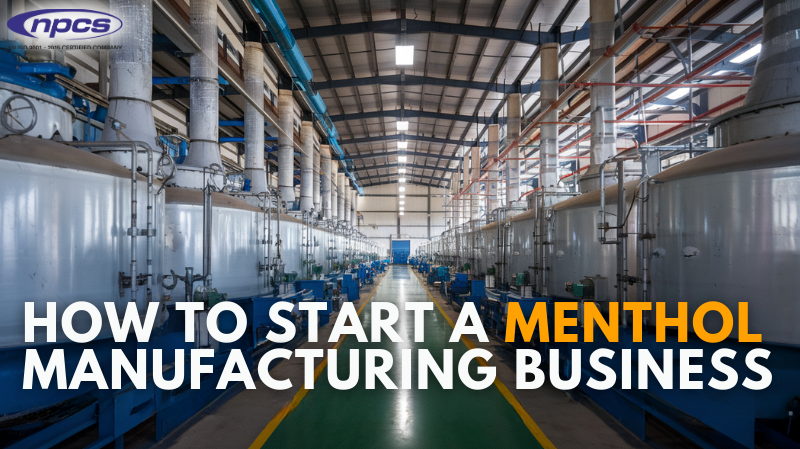Menthol is a natural product from mint plants that features a cooling sensation and a pleasing scent which finds use in many industries, including pharmaceutical and cosmetic products and food and beverage products. The growing popularity of menthol-based products in these various industries offers unique business opportunities. This guide will walk you through starting a menthol manufacturing business from discovering the product and market potential in the menthol space to the process of manufacturing to success frameworks.
What is Menthol?
Manufacturers primarily find menthol, a cyclic terpene alcohol, in peppermint oil. People recognize menthol for its mint scent and cooling sensation. Manufacturers use menthol in various products, including cough syrup, pain-relieving topical ointments and patches, candy, cigarettes, and cosmetics. Menthol can exist in natural or synthetic forms. Producers derive natural menthol from peppermint oil, which comes from mint.
Join With Us
Why Start a Menthol Manufacturing Business?
There are several unique reasons for starting a menthol manufacturing business.
- Strong Market Demand: The global menthol market is quickly growing as it is used in many different pharmaceutical products, personal care products and certain food products.
- Wide Scope of Applications: Menthol is found in everything from various medicines and cosmetics to candy and cigarettes so the practical customer base is quite broad.
- Export Capabilities: Menthol also has a notable export market as there are countries and nations with demand for the distribution of this product into the pharmaceutical and personal care applications.
- Scalable: The menthol manufacturing business can go from a small operation to large operation depending on the market demand and amount of resources available.
Benefits of Starting a Menthol Business
- Increasing Demand: The demand for menthol is increasing due to its widespread use in various applications with the most significant consumption in pharmaceutical and cosmetic products.
- Many Uses: The various uses of menthol makes it a versatile and important ingredient for a variety of products thus satisfying consistent and steady demand for menthol.
- Scalable Production: The production of menthol can begin on a small scale which can be scaled to grow the business.
- Expanding Global Markets: The menthol market reaches beyond domestic borders, providing extensive trade opportunities.
Visit this Page for More Information: Start a Business in Agrochemicals Industry
Top Applications of Menthol
- Pharmaceuticals: Cough syrups, lozenges, topical analgesics, and nasal inhalers are all examples of menthol applications for their soothing and cooling properties.
- Cosmetics: Menthol’s refreshing and cooling properties make it a crucial compound in lotions, balms, and many other products.
- Food & Beverage: Food includes chewing gum, candies and flavor agents.
- Tobacco Products: Menthol is often used in cigarettes to improve flavor and cooling effect.
Production Methods
Menthol is manufactured through distillation and crystallization processes. Here are the basics of the process:
- Raw Materials: The first step of producing menthol begins with sourcing good quality mint oil which is the natural source of menthol.
Distillation: Manufacturers heat the mint oil to separate menthol from other components.
Crystallization: After distillation, manufacturers cool down menthol to encourage crystallization and further process it without chemical modification.
Purification: Manufacturers separate menthol crystals from oil and wash them to achieve another level of purity for the crystals. They also achieve a level of vacuum.
- Packaging: The final product is placed in containers after the temperature and pressure is achieved.
Essential Machinery for Menthol Manufacturing
To be able to manufacture menthol, you will need certain equipment:
- Distillation Units: Which are utilized to extract menthol from mint oil.
- Crystallizers: Used for cooling down and crystallizing the menthol extracted from mint oil.
- Centrifuges: To separate menthol crystals from the oil.
- Purification Units: Used to purify menthol crystals for purity.
- Storage Tanks: Which are used for raw material storage such as mint oil and also for the final menthol product.
- Packaging Machines: To package the menthol crystals into items for consumption.
Related Business Plan: Pesticides
Starting Your Menthol Manufacturing Business
Once you have the equipment; follow these steps to establish your menthol manufacturing company:
Conduct Market Research
- Identify demand for menthol in your target market, potential customers, and competitors already established.
- Explore market trends and growth opportunities in sectors for pharmaceutical, cosmetics, food, etc.
Develop a Business Plan
- Create a comprehensive business plan which outlines production goals, target market, financial projections, marketing strategy, etc.
- Identify the production capacity and supply of raw materials, and categorize sales channels.
Comply with Regulations
- Source the necessary licenses and permits from the local and national.
- Ensure compliance with safety and environmental regulations for potentially hazardous materials; storage, verification and manipulation of materials.
Build Manufacturing Capabilities
- Set the manufacturing plan and ensure that equipment; distillation units, crystallizers, storage tanks etc… are in place.
- Verify your site is linked to safety standards and building adequate airflow and waste management.
Raw Material Relations
- Have a supply chain to purchase mint oil, as it will be the main raw material for menthol.
- Have vendors related in order to verify a level of quality assurance within your product.
Quality Assurance Implementation
- Put quantitative metrics for quality testing throughout the workflow, including raw material scoring and final product scoring.
- Initiate quality scores as consistent with an internal hard reference; in order to appeal to standards and orders.
Marketing & Sales Strategy
- Create a strong marketing strategy to get potential customers in the pharmaceutical, cosmetics, and food industries.
- Use marketing both online and offline to sell your menthol products.
- Exhibit your products at trade shows or industry-level activities to increase your market presence.
Commit to Research & Development
- Put money into research and development to innovate and improve your menthol products.
- Stay top of mind with trends and technologies in the industry to keep your competitive edge.
Conclusion
You can start a rewarding menthol manufacturing business because manufacturers use menthol in various applications, and menthol products have increasing market potential. If you follow the proper steps – comprehensive market research, customer identification, a process for manufacturing the product, and marketing the product – you can create, maintain, and grow a successful and viable menthol manufacturing business. Continuous innovation and adherence to quality standards and specifications are key to succeeding in a competitive marketplace. If successful, entrepreneurs can find an opportunity in the menthol market that promises sustained market success.






